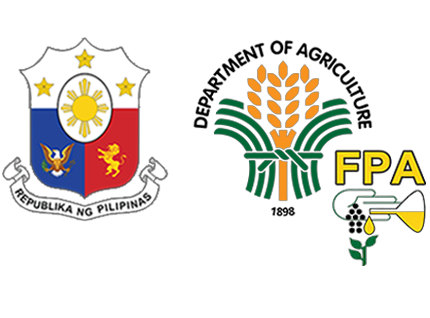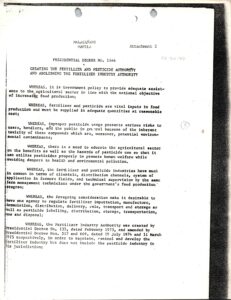About Us
Fertilizer and pesticides are indispensable inputs towards ensuring agricultural productivity and food sufficiency. Fertilizers supply the needed nutrients of crops while pesticides protect crops from adverse effects of pests, microorganisms, and weeds. The creation of the Agency is in response to the need to regulate fertilizer and pesticide imports and exports and ensure their adequate supply in the country.
History
1972-1973
The Philippine government created the Fertilizer and Industry Authority (FIA) by virtue of Presidential Decree No. 135 signed by Ferdinand Marcos on 22 February 1973. It serves as a response to the decrease in rice production caused by fertilizer shortage, series of natural calamities and prevailing oil crisis in the 1970s.
The Philippine government created the Fertilizer and Industry Authority (FIA) by virtue of Presidential Decree No. 135 signed by Ferdinand Marcos on 22 February 1973. It serves as a response to the decrease in rice production caused by fertilizer shortage, series of natural calamities and prevailing oil crisis in the 1970s.
1977
Since application of pesticide products goes side by side with fertilizers in agricultural production, the government thought of expanding its regulatory powers to pesticide industries. The FIA was then replaced by the Fertilizer and Pesticide Authority (FPA) which was created on 30 May 1977 by virtue of P.D. 1144. This is also attributed to the fact that fertilizer and pesticide industries possesses the same clientele, distribution channels, system of application in farmers’ fields and technical supervision by the same farm management technicians under the government's food production program.
Under the new law, FPA acquired broader powers with absolute control over the fertilizer and pesticide sector. FPA’s mandate can be categorized into regulatory, monitoring, evaluation, and promotion.
Since application of pesticide products goes side by side with fertilizers in agricultural production, the government thought of expanding its regulatory powers to pesticide industries. The FIA was then replaced by the Fertilizer and Pesticide Authority (FPA) which was created on 30 May 1977 by virtue of P.D. 1144. This is also attributed to the fact that fertilizer and pesticide industries possesses the same clientele, distribution channels, system of application in farmers’ fields and technical supervision by the same farm management technicians under the government's food production program.
Under the new law, FPA acquired broader powers with absolute control over the fertilizer and pesticide sector. FPA’s mandate can be categorized into regulatory, monitoring, evaluation, and promotion.
1986
The fertilizer industry was liberalized as part of the government’s policy to open up domestic agriculture to foreign competition. This included the abandonment of quantitative restriction for fertilizer and with it the price-setting function of FPA. Import duties were also reduced to one to three percent through a series of tariff reduction executive issuances.
1997
The Agriculture and Fisheries Modernization Act (AFMA) allowed the duty-free importation of fertilizer enterprises engaged in agriculture. The law exempts fertilizer subsidiaries from payment of the 12% Value-Added Tax.
May 5, 2014
FPA was transferred to the Office of the Presidential Assistant for Food Security and Agricultural Modernization (OPAFSAM) through Executive Order No. 165 signed by President Benigno Aquino III.
September 17, 2018
FPA was brought back to DA’s fold by virtue of Executive Order 62 signed by President Rodrigo Roa Duterte.
The fertilizer industry was liberalized as part of the government’s policy to open up domestic agriculture to foreign competition. This included the abandonment of quantitative restriction for fertilizer and with it the price-setting function of FPA. Import duties were also reduced to one to three percent through a series of tariff reduction executive issuances.
1997
The Agriculture and Fisheries Modernization Act (AFMA) allowed the duty-free importation of fertilizer enterprises engaged in agriculture. The law exempts fertilizer subsidiaries from payment of the 12% Value-Added Tax.
May 5, 2014
FPA was transferred to the Office of the Presidential Assistant for Food Security and Agricultural Modernization (OPAFSAM) through Executive Order No. 165 signed by President Benigno Aquino III.
September 17, 2018
FPA was brought back to DA’s fold by virtue of Executive Order 62 signed by President Rodrigo Roa Duterte.
FPA VISION / MANDATE
VISION
Improved quality of life for all Filipinos through increased farm incomes, productivity and food production using safe and appropriate fertilizer and pesticide inputs.
MANDATE
Assuring the agricultural sector of adequate supplies of fertilizer and pesticide at reasonable prices, rationalizing the manufacture and marketing of fertilizer, protecting the public from the risks inherent in the use of pesticides, and educating the agricultural sector in the use of these inputs.
STRATEGIC THRUSTS
Improved quality of life for all Filipinos through increased farm incomes, productivity and food production using safe and appropriate fertilizer and pesticide inputs.
MANDATE
Assuring the agricultural sector of adequate supplies of fertilizer and pesticide at reasonable prices, rationalizing the manufacture and marketing of fertilizer, protecting the public from the risks inherent in the use of pesticides, and educating the agricultural sector in the use of these inputs.
STRATEGIC THRUSTS
- Fertilizer and Pesticide Regulation
- Education/Product Stewardship
- Harmonizing with International Standards on Labeling
- Good Governance
General Functions
- LICENSING OF HANDLERS
- IMPORT CONTROL
- PRODUCT QUALITY AND ADHERANCE TO SAFETY
- INSTITUTIONALIZING OF PRODUCTS STEWARDHIP PROGRAM
- FERTILIZER PRODUCT REGISTRATION
- PESTICIDE PRODUCT REGISTRATION
- PUBLIC INFORMATION
- DEVELOPMENTAL
Licensing is required as a condition precedent to the importation, exportation, manufacture, formulation, repacking, distribution, delivery, sale, transport, storage and use of any fertilizer, pesticide and other agricultural chemicals.
Import control has been strengthened and institutionalized. From an agreement with the Bureau of Customs (BOC), shipments of pesticides will only be released by the BOC if covered by a corresponding FPA Certificate Authorizing Importation of Pesticide (CAIP). An agreement is likewise established with the Bangko Sentral ng Pilipinas which in turn issued a circular to all commercial depository banks not to issue letters of credit (L/Cs) to any pesticide importer with no appropriate CAIP issued by the FPA.
In coordination with government product standards agencies, FPA designs and implements quality control standards for fertilizer and pesticide products. It also monitors safe handling, use, application and compliance with industrial health and safety in manufacturing and formulation plants, impose penalties and sanctions for violation of set rules and standards.
The pesticide industry and end-users, manufacturers, sellers, and buyers, are enjoined to adopt and undertake a cradle-to-grave approach to pesticide management, primarily the training of handlers and the public on the safe and judicious use of pesticide and the dissemination of information materials. The program is required for every pesticide product wherein registrants are made primarily responsible for the conduct of stewardship program for their products.
All Fertilizer products, organic or inorganic, raw materials and ingredients for fertilizer, which are imported or produced locally, should be registered with FPA. Registration requirements include the submission of production specification supported by chemical analysis, mode of action, product type and the result of efficacy trials conducted by an FPA accredited and independent researcher. The set of data is evaluated by a registration consultant. With the continued production of new grades, brands and type of locally produced and imported fertilizers, to take advantage of the increasing market demand, a wide range of products for selection are provided. Registration of these commercially processed fertilizers is therefore needed to give greater assurance that the quality of each brand is maintained as the specified standards (characteristics and effort) as claimed by the registrants. Fertilizer handlers such as importers, distributors, exporters, manufacturers, bulk blenders and processors should register their products with FPA.
This is a mechanism to generate relevant information to ensure safety, public health and environmental protection in the use of the pesticides. Data and information generated are required to support the product label statement for effective application and precaution for safe use. This includes specific instructions in case of poisoning. Registration of biorational pesticide that includes biochemical and microbial pest control agents which are naturally occurring or must be structurally identical to naturally occurring chemicals if synthesized. Exposure studies are required for new proprietary products with strong toxicological concern. Fast tracking of registration of less hazardous, less persistent, environmentally- friendly, target and Integrated Pest Management (IPM) compatible pesticide products. Harmonization of pesticide registration requirements envisioned to share expertise and pooled resources to build the necessary capabilities for such purpose.
Regular conduct of trainings and accreditation programs for handlers of fertilizer and pesticide products that involve: 1) Fertilizer and pesticide dealers and distributors 2) Mango Contractors 3) Pesticide Applicators (agricultural pest exterminators and fumigators) 4) Fertilizer and pesticide researchers for the conduct of field-testing and experimentation for product registration. In addition, FPA conducts training on the Safe and Judicious Use of Fertilizers and Pesticides nationwide. FPA also monitors fertilizer and pesticide prices and disseminates information on the proper and effective application of fertilizer and pesticide through IEC materials, media, dialogues, symposia, trainings and seminars.
This includes a) fertilizer and pesticide industry coordination and support, b) promotion of safe and judicious use of fertilizers and pesticides, and c) coordination with other government agencies relative to the further development of the Philippine agriculture sector.


